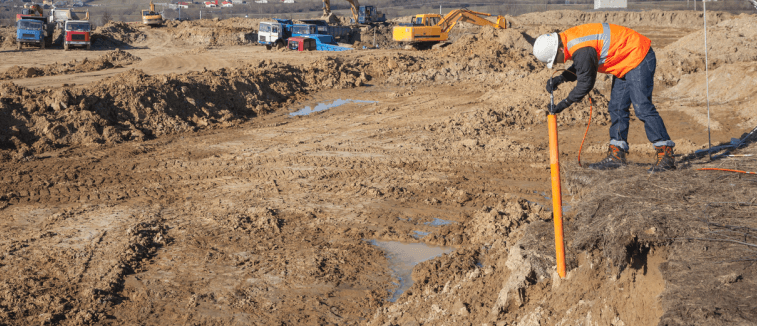The Single Strategy To Use For Geotheta
The Single Strategy To Use For Geotheta
Blog Article
The Best Strategy To Use For Geotheta
Table of ContentsSome Known Details About Geotheta Geotheta - TruthsExamine This Report about GeothetaHow Geotheta can Save You Time, Stress, and Money.The Definitive Guide for Geotheta

They conduct site examinations, accumulate samples, execute lab tests, and evaluate data to assess the suitability of the ground for building and construction jobs - Engineer of Record. Based on their findings, geotechnical engineers supply recommendations for structure layout, slope stability, retaining structures, and reduction of geotechnical risks. They team up with other specialists, such as architects, structural designers, and building teams, to make sure that geotechnical considerations are incorporated into the total task style and execution
By evaluating the behavior and residential properties of dirt and rock, they can recognize potential geotechnical threats such as landslides, dirt negotiation, or slope instability. Their expertise aids stop failures or accidents that might threaten lives and residential or commercial property. Below are some comprehensive obligations and responsibilities of a geotechnical designer: Site Investigation: Geotechnical engineers conduct site examinations to gather information on subsurface conditions.
They interpret the data to recognize the residential or commercial properties and behavior of the soil and rock, including their stamina, permeability, compaction qualities, and groundwater conditions. Geotechnical Analysis and Style: Geotechnical engineers evaluate the data accumulated throughout site investigations to analyze the stability and viability of the website for building projects. They execute geotechnical computations and modeling to examine elements such as birthing capability, settlement, incline stability, lateral planet stress, and groundwater flow.
Geotheta Can Be Fun For Everyone
Structure Design: Geotechnical engineers play an important role in designing foundations that can securely support the intended framework. They assess the soil problems and tons demands to establish the suitable foundation kind, such as shallow structures (e.g., grounds), deep foundations (e.g (https://www.abnewswire.com/companyname/geotheta.com_139529.html#detail-tab)., heaps), or specialized strategies like dirt enhancement. They consider variables such as negotiation limits, bearing capability, and soil-structure interaction to establish optimal foundation styles
They assess building plans, display site tasks, and perform area evaluations to confirm that the design suggestions are complied with. If unexpected geotechnical concerns emerge, they examine the situation and offer referrals for remediation or adjustments to the design. Risk Analysis and Mitigation: Geotechnical engineers analyze geotechnical hazards and risks associated with the project website, such as landslides, liquefaction, or soil erosion.

Collaboration and Interaction: Geotechnical designers work closely with other professionals involved in a task, such as architects, architectural designers, and construction teams. Effective communication and collaboration are important to incorporate geotechnical considerations into the total task style and building and construction process. Geotechnical engineers supply technological knowledge, response questions, and ensure that geotechnical needs are satisfied.
See This Report about Geotheta
Below are some sorts of geotechnical engineers: Foundation Designer: Structure engineers concentrate on designing and evaluating structures for structures. They analyze the dirt problems, load needs, and site attributes to establish the most ideal foundation kind and layout, such as superficial structures, deep foundations, or specialized methods like stack foundations.
They examine the aspects affecting slope security, such as dirt properties, groundwater conditions, and slope geometry, and establish techniques to stop incline failings and reduce dangers. Quake Designer: Quake engineers specialize in evaluating and creating frameworks to hold up against seismic forces. They assess the seismic risk of a website, review dirt liquefaction capacity, and create seismic style criteria to make sure the safety and security and resilience of structures during earthquakes.
They execute field testing, accumulate samples, and evaluate the accumulated data to characterize the soil residential or commercial properties, geologic developments, and groundwater conditions at a website. Geotechnical Instrumentation Designer: Geotechnical instrumentation engineers concentrate on surveillance and determining the actions of soil, rock, and frameworks. They set up and keep instrumentation systems that keep track of elements such as dirt settlement, groundwater levels, slope activities, and architectural displacements to analyze efficiency and provide very early cautions of possible problems.
The Definitive Guide for Geotheta
They perform examinations such as triaxial examinations, debt consolidation examinations, direct shear tests, and permeability examinations to collect data for geotechnical evaluation and style. Geosynthetics Engineer: Geosynthetics engineers specialize in the design and application of geosynthetic materials, such as geotextiles, geogrids, and geomembranes. They make use of these products to enhance dirt stability, enhance slopes, supply water drainage remedies, and control erosion.
They tend to be investigative people, which suggests they're intellectual, reflective, and investigative. They are interested, methodical, sensible, analytical, and rational. Some of them are likewise social, implying they're kind, charitable, cooperative, person, caring, valuable, empathetic, sensible, and friendly - Consulting Engineer.
In the workplace atmosphere, geotechnical designers use specialized software application devices to perform estimations, produce designs, and assess information. They prepare reports, evaluation project requirements, interact with clients click here for more info and staff member, and coordinate job tasks. The workplace setup provides a conducive setting for study, analysis, and collaboration with various other experts associated with the project.
Some Of Geotheta
They frequently see task sites to carry out site examinations, assess geotechnical conditions, and collect data for evaluation. These gos to entail traveling to different places, in some cases in remote or tough terrains. Geotechnical designers might do soil sampling, conduct tests, and display building activities to ensure that the geotechnical aspects of the task are being implemented appropriately.
Geotechnical designers also function in specialized geotechnical labs. In these centers, they conduct experiments, carry out examinations on dirt and rock samples, and assess the design buildings of the products. Geotechnical research laboratory engineers function extensively in these settings, managing testing devices, running tools, and videotaping information. They collaborate with various other lab staff to ensure accurate and reliable screening results.
Report this page